“Technological heart of Wielkopolska” is the name given to the Poznań University of Technology in the special issue of the “Voice of Polytechnic” magazine. It is about research conducted in this higher education institution and its impact on society and the Polish economy. For many years, this heart is open to friendship and cooperation with Ukraine, in particular, with NTUU “Igor Sikorsky Kyiv Polytechnic Institute”.
In March 2018, NTUU “Igor Sikorsky Kyiv Polytechnic Institute” welcomed guests from Poznań University of Technology, also well known as Poznań Polytechnic. The parties concluded a Statement of intent to create and launch a joint nanosatellite.
Then, on behalf of KPI, the Vice-rector for scientific work, Academician of the National Academy of Sciences of Ukraine Mykhaylo Ilchenko and the Head of the laboratory of nanosatellite technologies at the Faculty of Thermal Energy Borys Rassamakin signed the Statement. On behalf of the Poznań University the Dean of the Faculty of Electronics and Telecommunications, Professor Krzysztof Wesolowski and Professor Andrzej Kasinski signed this document. On the Polish part, Professor Rafal Krenz and coordinator for the development of Polish-Ukrainian cooperation Olga Vakhrina also participated in the meeting and discussion of future joint work and its results.
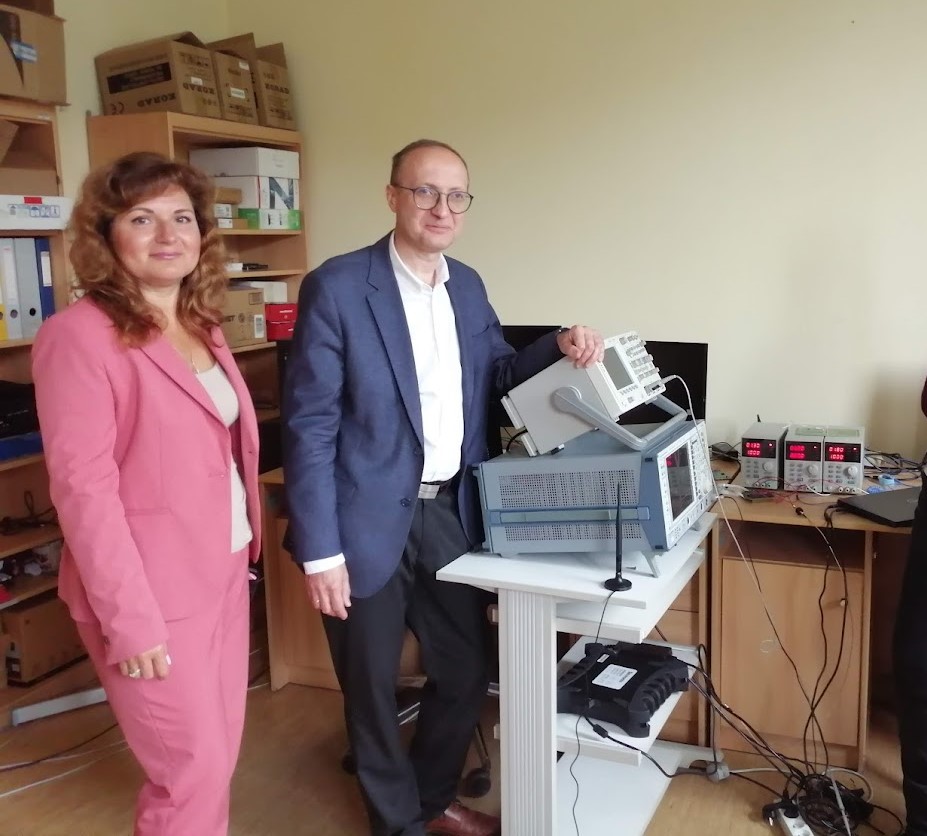
The next months passed in the exchange of opinions, adjustments, and agreements. The space project is not the only thing that binds technical universities. They concluded the agreement on cooperation within the EU Erasmus+ program, the agreement on a double degree at the Master’s level in biomedical engineering and mechanical engineering. Now there is an agreement about space research.
In 2019, Kyivites visited partners in Poznań, got acquainted with their academic and scientific activity, visited their laboratories… Then Covid started on the planet, communication continued in online mode, each party did its “homework”. The parties planned its completion, hence, the next meeting.
However, on February 24, 2022, a war began in Ukraine.
Meeting at the Institute of Radio Communication
…We arranged a meeting with Dr. Rafal Krenz, whose team is actively involved in the creation of the nanosatellite, and Olga Vakhrina, coordinator for the development of Polish-Ukrainian cooperation at the University’s International office, in the premises of the Faculty of Informatics and Telecommunications of the Poznań University.
Like the Kyiv Polytechnic, the Poznań Polytechnic occupies a considerable area. However, in contrast to the KPI campus with its educational and scientific buildings, student dormitories, official and residential premises, sports facilities and a large ancient park located mainly in one district of Kyiv, Poznań University of Technology has several locations in the city. The place for the meeting is organically integrated into a cozy residential neighborhood, and at first glance, you would never say that it is an educational institution whose projects are related to the space.
Professor Rafal Krenz and his colleagues are engaged in receiving information from space, creating a system of radio signals using satellite equipment. The professor is a specialist in electronics and telecommunications, as well as computer science; he is a graduate of Poznań University of Technology. He has been engaged in digital wireless communication systems for about two decades. His current research is in Software Defined Radio (SDR) as applied to high data rate wireless systems. Therefore, the inclusion of Rafal Krenz in 2018 in the Polish delegation, which was headed by the then president of the Polish Space Agency, Grzegorz Brona, was by no means accidental. It was up to Professor Krenz and his colleagues to give the Ukrainian-Polish nanosatellite a “language” in order to create a signal that would deliver news from airless space in a high-quality and unobstructed manner.
The work of Olga Vakhrina, coordinator for the development of Polish-Ukrainian cooperation of the PUT, specialist at the International office of the Poznań University, is also closely related to Ukraine: Olga is a Ukrainian from the Sumy region. Her Alma Mater is the Kyiv Polytechnic Institute; it was there that she began her career.
— I came to Poznań as a young scientist under the Erasmus Mundus program, Olga says. — I did an internship for a year and a half and stayed in the city I fell in love with. Here I continued my scientific work and international activities.
Ms. Vakhrina translates our conversation, but sometimes, deep in the ideas, we speak both Polish and Ukrainian at the same time. This is exactly how it was in Kyiv, during the work on the text of joint agreements, when there was an exchange of opinions and proposals, Olga recalls.
… Prof. Krenz tells us the history of his native University, which began 103 years ago, when the Higher State School of Machinery and Electrotechnics was founded on the basis of the Higher State School of Machinery. It was supposed to become Poznań University of Technology but by World War II interrupted its development. The war pushed the educational institution back to its initial position: after the war, it had to work its way from the Higher Engineering School to the University of Technology again. Later, especially after the 1990s, when Poland became part of the EU, its rapid development began: various faculties emerged, grew, merged, split, were renamed (in Poland they are called departments), and institutes were created within the departments. (Yes, institutes are within faculties.) New specialties, new technologies appeared, the participation of the higher education institution in the development of the country continuously grew.
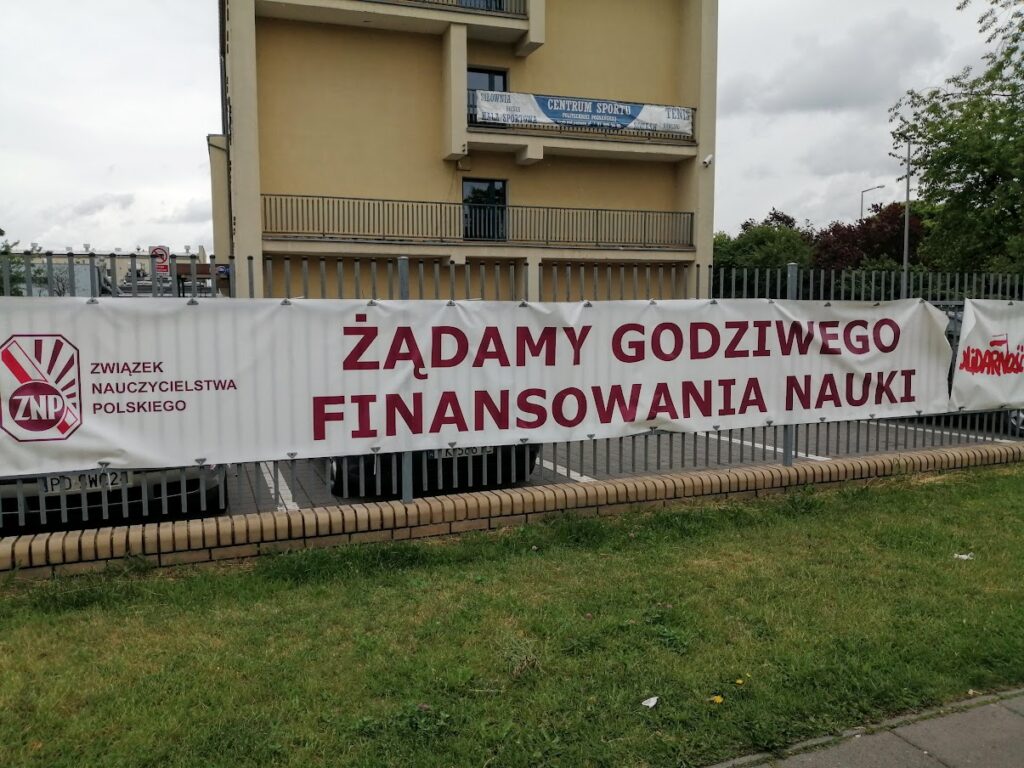
— Thus, our Faculty of Electronics and Telecommunications became the Faculty of Informatics and Telecommunications two years ago. 4 institutes were established within its structure, and one of them is our Institute of Radio Communication, — Rafal Krenz clarifies.
— In 2019, the Poznań Polytechnic marked 100th anniversary, the celebration was organized at the state level, Ms. Bakhrina says. — President of Poland Andrzej Duda came to us. At that time, our scientists received many state awards for their achievements in science and academic work.
Today, the Poznań University of Technology is one of the leading technical universities in Poland. More than 20,000 students study at 10 faculties in 28 fields, combining studies with scientific and research work. More than a thousand teachers work at the University; students and their mentors conduct research in 150 modern laboratories. Poznań Polytechnic has achievements recognized by the world scientific community, in particular in the design of unmanned aerial vehicles and hybrid car engines. A new important topic is exploration of the outer space.
What contributed to the rapid development of the University?
— International cooperation has become a significant driver of rapid changes. — Olga Vakhrina is convinced. — Faculties and institutes participate in many projects. These are both ministerial and international projects, in particular, those of the European Union, thanks to which we receive financial support. Cooperation with big business plays an important role. Our institute cooperates with Nokia, Siemens, other well-known companies. We have joint projects with partner universities. Ukrainian universities are among them.
Professor Krenz has great experience of joint work with European colleagues. He worked on implementation and improvement of software for the fifth generation of mobile communication. Devices developed by scientists led by Professor Krenz are used nowadays for fourth-generation mobile phones.
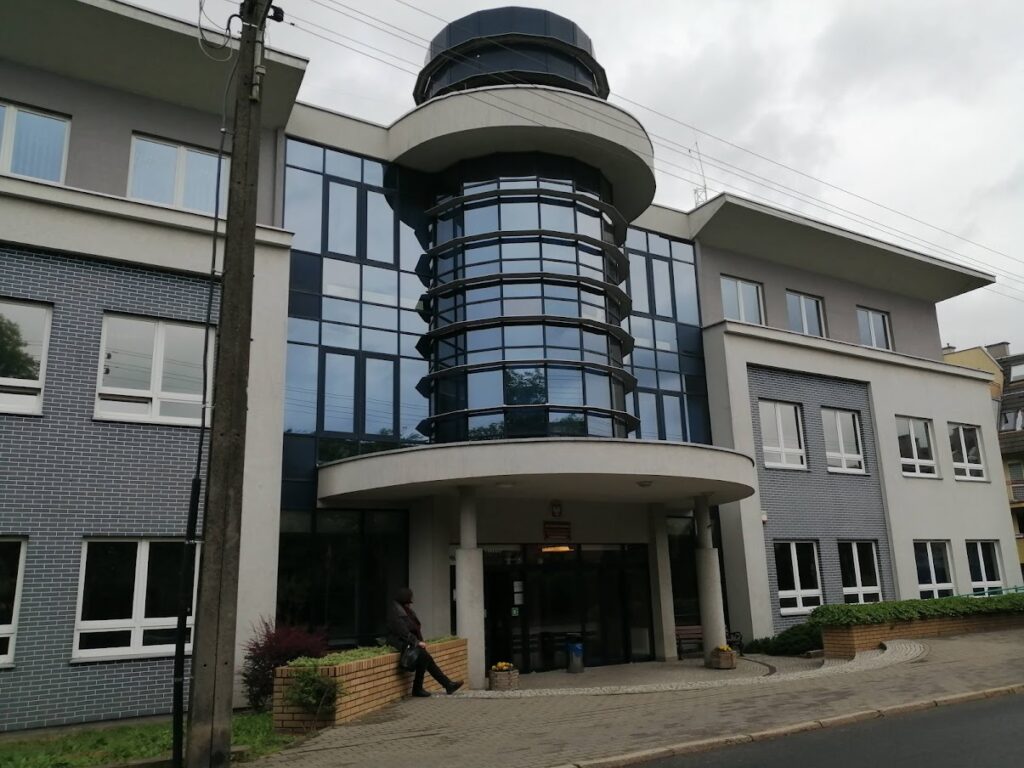
— It was a very important project for us, — Prof. Krenz recalls. — Several dozen partners from various countries took part in it. Krzysztof Wesolowski managed the project, he also headed our University delegation during its visit to Kyiv.
— How did your personal cooperation with KPI begin? Why did you decide on KPI? — I put this question to Prof. Krenz.
— We know Kyiv Polytechnic as a pioneer in many fields, in particular in aviation and space, — he answers. — This is a partner with vast experience and great success. We knew that their satellites had shown themselves excellently. The first PolyITAN-1 has already set a world record — it has been winding circles around the Earth for eight years. The second PolyITAN was successful too… Work continues on the next satellites. Therefore, it was quite tempting to take part in the third one.
— Did you earlier deal with satellites at the University?
— My specialty is signal systems, radio signal structure, in particular in space. However, at every faculty of our University, cosmonautics has its place, for example, at the Faculty of Automation and Robotics, or Informatics and Telecommunications, Engineering and Aircraft Construction; each of them has its own space component in research. We also form collective teams if it is necessary to unite for a joint project, for example, creation of a rocket engine.
— Cooperation with Kyiv Polytechnic took place at our University, but it was not so active. — Ms. Vakhrina adds. — We entered a more active phase in 2017, when we started working in joint teams. The institute where Prof. Krenz works is one of the important components of cooperation. We also have other examples: our biomedical engineering team works closely with the Faculty of Biomedical Engineering of KPI, headed by Professor Vitaliy Maksymenko. The Faculty of Mechanics and its institutes cooperate with the Educational and Scientific Institute of Mechanics and Mechanical Engineering, headed by Mykola Bobyr, Associate Member of the National Academy of Sciences of Ukraine. We also have a dual degree program. By the way, the first graduation took place in 2019, when the University celebrated its 100th anniversary. Then many famous scientists came, and many of them wanted to attend the Master’s degree defense; there were two Kyivites defending their theses. Can you imagine: two examination commissions from KPI and Poznań University, and many guests, big heads of science from almost all over the world. But the graduates of ESIMME KPI responded so brilliantly that a professor from the Université Polytechnic Hauts-De-France, who was present at the defense, was deeply impressed and declared that it was not just a Master’s, but a PhD degree defense. (The defense was in English.) Both of our Universities offered graduates to continue their studies as postgraduate students.
— Did they stay in Poland?
— No, they returned to Ukraine.
When will PolyITAN-3 be launched?
PolyITAN-3PUT (the last letters are the abbreviation of the Poznań University of Technology) has a sound purpose — it shall be equipped with special equipment for remote sensing of the Earth. It is assumed that its resolution will be good for both economic and defense purposes. The satellite can also carry out environmental monitoring and ionosphere studies.
Professor Krenz and his team work on a development that can be used on other nanosatellites built in Poland.
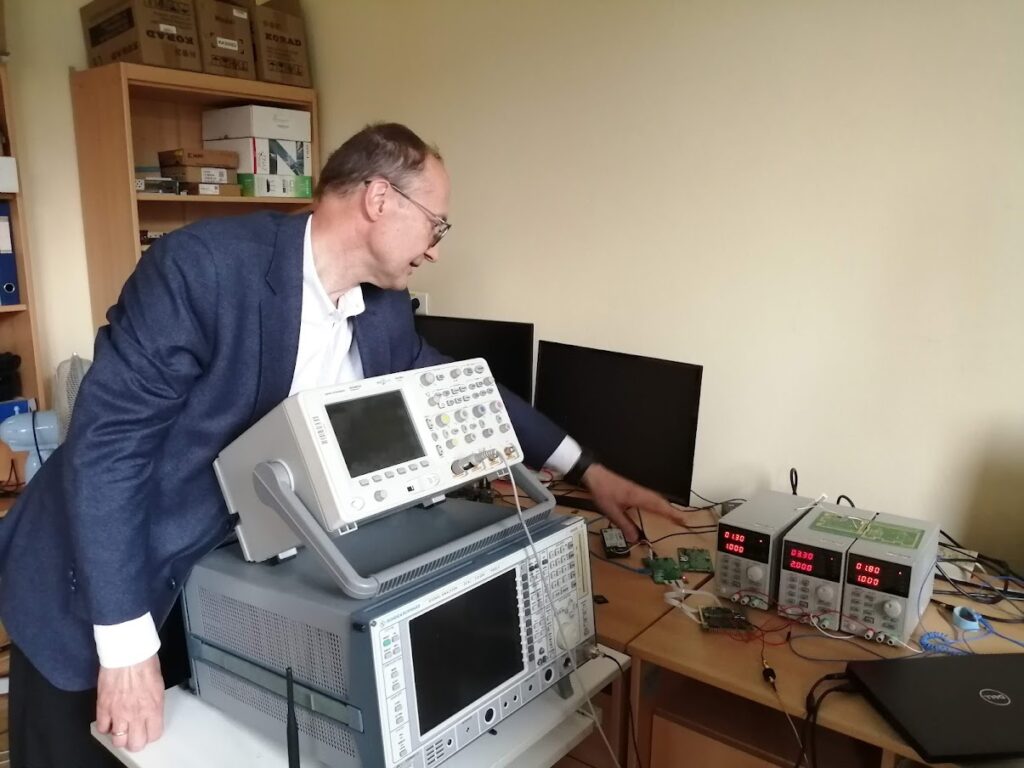
— Today, a module is created that will be used to test the signal, — says the professor. — A ground station, which will receive this signal, is already built. At this time, we test the station’s equipment in the laboratory. More than 80% of the work is already completed. We hope that in the next six months we will complete all the research and be able to demonstrate the signal to our partners from Kyiv in order to install the equipment on the satellite.
— Within the framework of the project, we purchased solar panels, which were specially developed for this satellite by an Italian company specializing in this type of products, — adds Olga Vakhrina. — The station, which will receive a signal from space, will simultaneously work in Poznań and Kyiv, its principal elements will be located both in our Polytechnic and in Ukraine. All of these items are already purchased. We placed ours on the roof of a skyscraper. Unfortunately, we did not have time to transport to Ukraine those elements that should already be in Kyiv. The war intervened. We couldn’t risk because the equipment is expensive, so we keep it here for now. It turns out that each party is doing its part of work now, and we can only hope that in six months we will be able to bring our work together, and no one and nothing will stand in our way at the final stage.
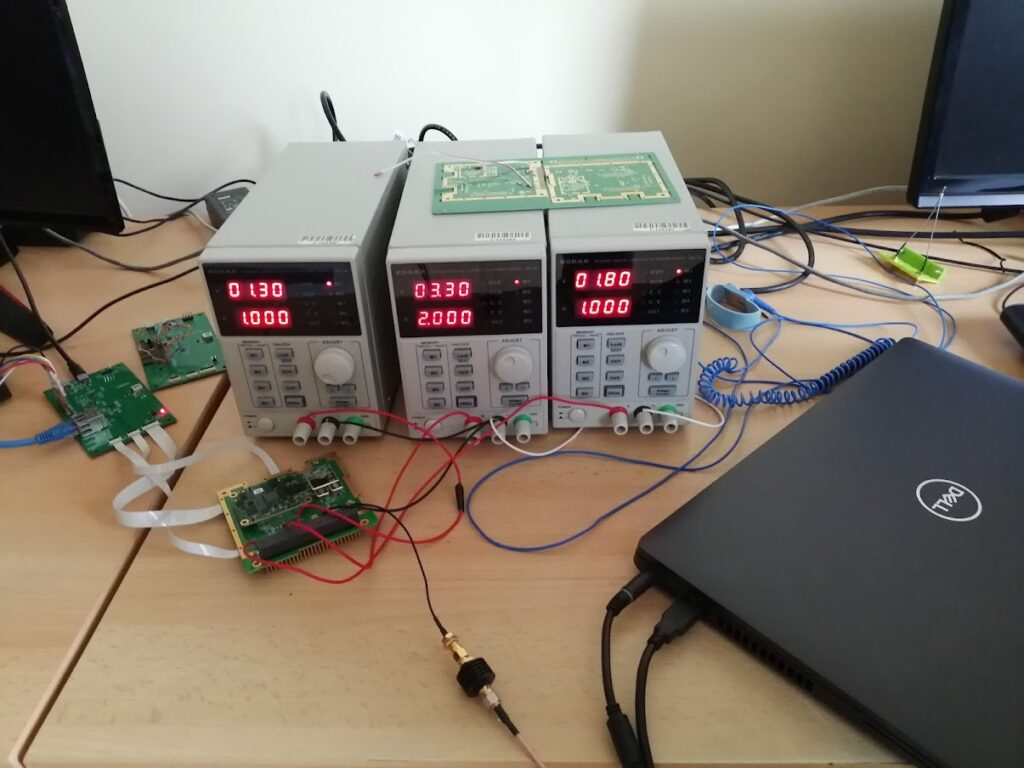
In Professor Krenz’s laboratory
We continue the conversation in the laboratory, where the equipment intended for PolyITAN-3 is tested. Many parameters: signal strength, modulation change, power consumption are examined… All appropriate tests are carried out, which will enable the satellite to maintain fixed communication with the Earth. One of the important tasks is to install an antenna array on the satellite, which will make it possible to amplify and improve the quality of the signal when using several antennas, and combine their capabilities, the professor says.
Mr. Krenz says that students also took an active part in creating a radio signal for the PolyITAN-3 project, especially, third-year student Nikolo Zlochev and PhD student from Kazakhstan Ilyas Zainuddinov. In the Poznań Polytechnic, there is a tradition of attracting the best students to the implementation of important projects, the professor says. When a project application is submitted, the student component and a certain part of the funding is already specified in it.
— By the way, about funding… A big slogan about the need for decent funding of science is exposed near the entrance to the campus. It reminded me of Ukraine. Do you have problems with financing too?
— Yes, we believe that the funding of science is at a low level, — Professor Krenz agrees. — The defining role belongs to the authorities, and science is not a priority for them.
— Indeed, it is not easy to get financing, — clarifies Ms. Vakhrina. — Professor Krenz together with Ukrainian scientists managed to get funds for this project. The sponsor was the Narodowe Centrum Badań i Rozwoju Foundation, which allocated PLN 5 million for this purpose. The term of work is two years. At the same time, we are part of the Polish project, which is worked on by the team of the Polish commune, which builds its own nanosatellite. That is, the system signal will be used both on PolyITAN-3 and on nanosatellites built by the Polish company. The financing is from the regional foundation and from European sources. As for our project, it is financed only from a European source.
— We have really fantastic cooperation with Kyiv, — Rafal Krenz says, — and this is the field where we can combine our strengths. We shall conduct scientific research, which may grow into much larger projects in the future.
— There are good attempts to make nanosatellites in Poland, —Ms. Vakhrina adds. — First of all, this is the work of the Warsaw Polytechnic, but our project is distinguished by the fact that it is the first international nanosatellite. This is Polish-Ukrainian cooperation. To a certain extent, you can even say that it is a students’ cooperation. We hope to achieve a significant result.
Cooperation under conditions of war
— This year at the beginning of May an online meeting of our rectors, Michael Zgurovsky and Teofil Jesionowski, took place — Olga Vakhrina says, — the vice-rectors were also present at the meeting. It was about the cooperation of Universities under war conditions and the support of scientists during these difficult times. More than a dozen topics were mentioned during the conversation, that could be of interest to both parties. I know that they spoke about the expansion of cooperation in the field of electronics, computer technologies, chemistry, and mechanics. Many Poznań scientists became interested in these topics.Someone has already contacted Ukrainian colleagues and continued the discussion. By the way, the five-year agreement between our Universities ends this year, so our Rectors agreed to sign an extended agreement containing new lines of research.
— Did Ukrainian scientists come to Poznań in these war times?
— We have had several proposals from different faculties for projects they are currently working on. This was our University’s decision to involve Ukrainian researchers, so that they would have not only financial support, but also continue to realize themselves as scientists. We sent our proposals to partner universities in Ukraine. Some of them responded. However, I must say that it is not an easy matter. It is needed to know the language, have specific narrow-focused knowledge, and it is important whether a person can come and work in the laboratory… Nevertheless, we are ready to contribute as much as possible to the joint scientific research of Polish and Ukrainian scientists.
Both Erasmus plus and EUNICE
Leaving Professor Krenz at the Institute of Radiocommunication, Ms. Vakhrina and I went to the International office, located a few tram stops away. We walked at a leisurely pace and after about two hundred meters we entered the territory of the Piotrowo campus. As we walked, Olga showed me the Faculty of Chemical Technology, the Faculty of Architecture, the Faculty of Mechanical Engineering and Management, the Faculty of Computer Engineering, the Faculty of Electrical Engineering, the Center for Languages and Communications.We see the Building “with a Clock”, a Conference Hall and a Library. … Dormitories are nearby. Olga says that their heating system is based on technologies of earth, wind and sun energy use. The “Building of Construction”, which houses the Faculty of Civil and Transport Engineering and, accordingly, several of its institutes, also houses the International office.
Room number 110 is the most popular during the university admission process. It is a “big international” here: future PUT students from many countries consult about documents, conditions of admission, their accommodation, etc. They speak different languages, mainly Polish and English. Representatives of 60 countries study at the Poznań University. Olga shows the door “flowered” with colored postcards, on which everyone writes greetings in his or her native language, from Chinese characters to Cyrillic, Latin or Arabic.
There is a large-size flag of Ukraine in Olga’s office. We are already used to seeing Ukrainian flags on houses, office entrances, and balconies of common Poles’ apartments. Nevertheless, it does not cease to excite us.
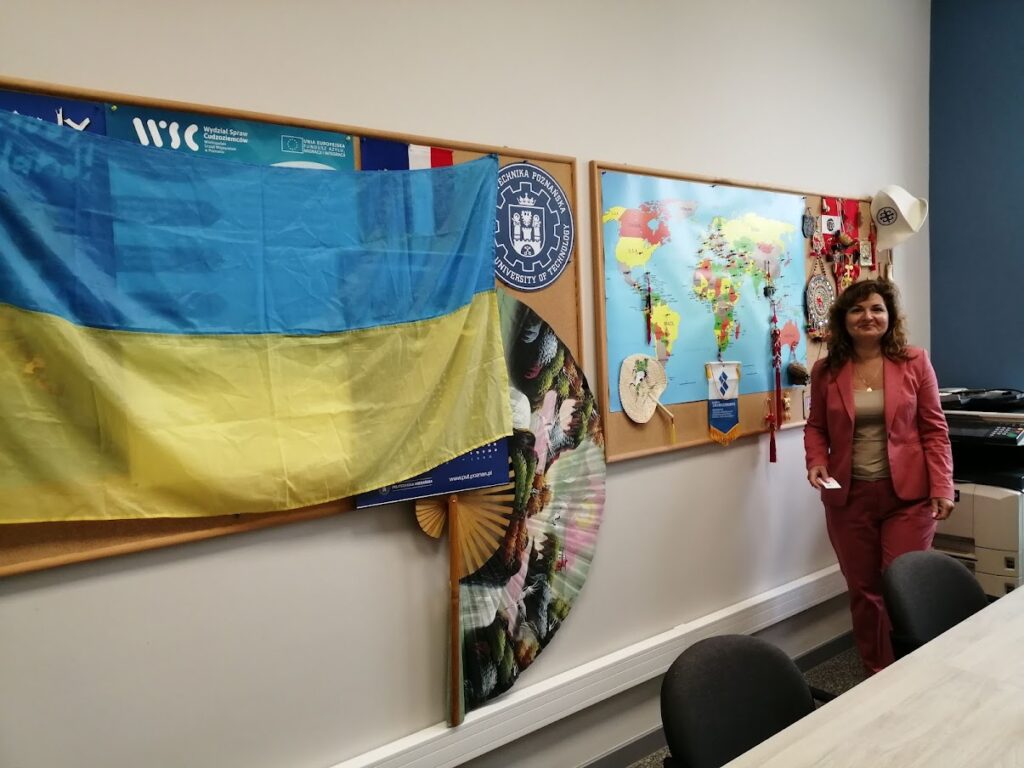
Here, in the International office, there are several focus areas. We get to know the young, energetic and friendly team of the office.
— Many students come to us under the Erasmus+ program, — says Iwona Piehotska, who leads this focus area. — Over a hundred Ukrainians become our students every year for a certain period specified in their programs.
— Besides, our students have the opportunity to study at EUNICE European University, — Magdalena Sikorska and Marta Lipinska add.
— This educational institution was created by 7 European universities from Germany, Italy, Spain, Portugal, Belgium, Finland and France, — explains Olga. — First of all, there are technical universities, but humanitarian areas are also present. Poznań Polytechnic is a leader of this association. EUNICE offers students studying at partner universities to broaden their educational horizons. One of the main goals is to develop innovations and conduct scientific research, to expand and deepen the knowledge. Individual programs are developed, special funding exists. For example, admission to pilot courses organized jointly with partner universities is announced. Classes are held mostly online. Every university offers topics that deepen knowledge, arouse interest, and encourage scientific research. For example, our University offered a course on cyber security. There is a lot of interest in this topic. We also had a course on unmanned aerial vehicles. The Brandenburg University of Technology held a course on conservation of ruins and archaeological monuments. Students completed the Introduction to International Business course with the University of Vaasa from Finland. (By the way, the Rector of this higher education institution was recently a guest of several Kyiv universities, in particular, Igor Sikorsky KPI – author.) It is interesting that each of these additional courses can be included in the supplement to the diploma. That is, it will be officially recognized and considered one of the competencies of a University graduate.
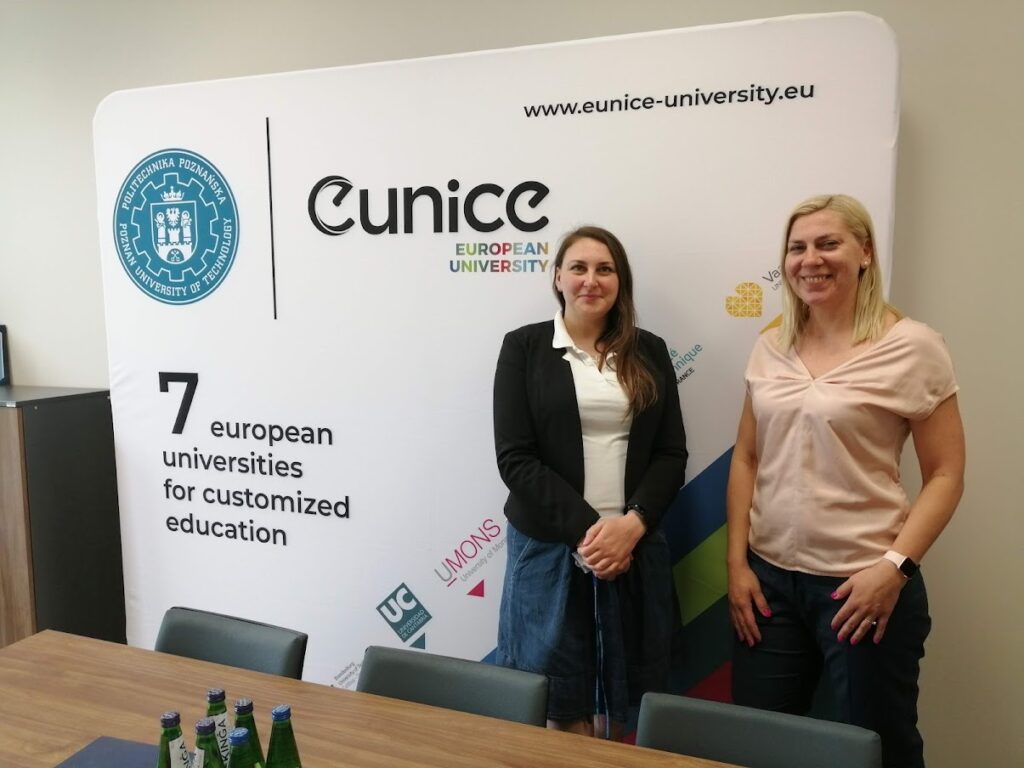
…It’s time to open the way for people to work. We thank for the hospitality and hope to see our colleagues in Kyiv in half a year, when the first Ukrainian-Polish nanosatellite will be assembled. All its systems will be tested, and successful and long-lasting work will be ensured. The benchmark is: to work no less than PolyITAN-1 moves through the space!
We believe that no rascist vermin will prevent the partners from successfully completing this project. Certainly, other projects will be next.
Larysa OSTROLUTSKA
Photos by Nina BALYKOVA
